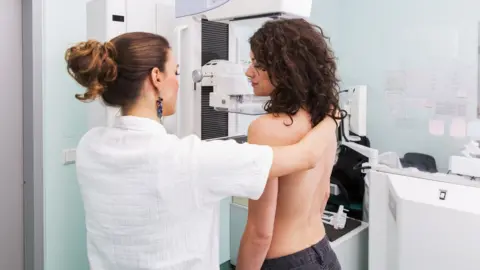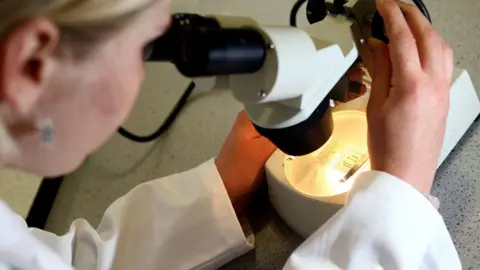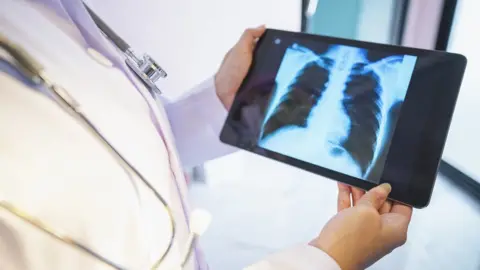Cancer: Number of diagnoses in Northern Ireland continue to rise
 Getty Images
Getty ImagesThe number of people being diagnosed with cancer in Northern Ireland has continued to rise.
Over the last five years there has been a 9% increase in female breast cancer cases and 6% increase in lung cancer.
Figures from the Northern Ireland Cancer Registry also suggest that more people are surviving and living longer.
The report highlights the importance of screening, in particular access to the new FIT test for bowel screening.
It is believed that an aging population and an increase in cancer screenings are partly behind the rise in diagnoses.
This latest study focuses on six cancers - breast, lung, stomach, melanoma, colorectal and oesophageal.
Survival rates
Between 2012 and 2016, five-year survival rates improved for a number of cancers including lung, colorectal, female breast cancer, oesophageal and stomach cancer.
This is attributed to improved treatment and early detection.
According to the data, improvement in survival rates is also linked to better access to screening where cancers are detected earlier and can be treated sooner.
For example, five-year survival is 8% for late-stage colorectal cancer compared to 94% for early stage.
Five-year survival is 20% for late-stage breast cancer, compared to 97% for early stage, and 2% for late-stage lung cancer, compared to 52% for early stage.
 David Davies
David DaviesCovid-19 had a significant impact on cancer diagnosis.
In terms of new cancers diagnosed, there was considerable recovery in the number of cases detected in 2021 compared to 2020 - the first year of the pandemic.
There was a rebound increase in bowel cancer (up 17%) and breast cancer (up 9%) in 2021 compared to 2018-19
For bowel cancer, the review found a higher proportion of bowel cancer patients aged 55 to 64, which according to the review is "likely related to the resumption of cancer screening programs as well as the introduction of new FIT test for bowel screening in January 2021".
It has been a different picture in terms of lung cancer.
Findings show a significantly higher proportion of people were diagnosed at a later stage with poorer one-year survival rates for patients in 2021 compared to 2018-19.
Almost half (48%) were found to have a more advanced disease in 2021 compared to 42% pre-pandemic.
A lower proportion of lung cancer patients also had surgery, which is likely due to it being detected later.
 Getty Images
Getty ImagesDr Damien Bennett, interim director of the Northern Ireland Cancer Registry, told the BBC's Evening Extra programme that the pandemic likely played a part.
"With lung cancer patients, because of the symptoms they would have - for example a new cough or shortness of breath - that overlaps very closely as you remember with Covid symptoms," he explained.
"So there was probably and element of delayed diagnosis there from that perspective, because we remember back in terms of restricted access to services, to primary and secondary care, especially for people with those specific symptoms."
As well as patients being advised to stay away from health facilities if they had a new cough during the early stages of the pandemic, Dr Bennett said "the public themselves may have been wary of attending health care settings" due to the risk of Covid infection.
Male breast cancer
The Northern Ireland Cancer Registry also produced a separate, extensive report on male breast cancer for the first time.
It shows that it is a rare cancer with one in 714 men developing breast cancer by the time they are 85 years old compared to one in eight women.
The report shows men are also likely to be on average 10 years older than women when they are diagnosed, with a median age for diagnosis of 72.
In 2021, there were 85 male breast cancer survivors in Northern Ireland compared to 17,663 women.
